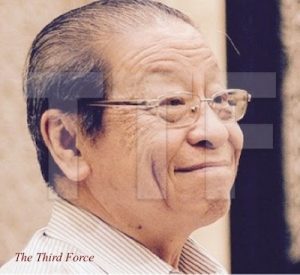TTF: Ever since the National Security Council (NSC) Act was first proposed by the administration of Dato’ Seri Najib Tun Razak, Dr Mahathir Mohamad and Lim Kit Siang went around town describing the act as “monstrous,” even accusing Najib of abusing human rights and democracy. Following are excerpts of a media statement Kit Siang made on the 20th of December 2015 (in orange):
The monstrous National Security Council (NSC) Bill made history of sorts when it spearheaded a European Parliament motion condemning human rights violations in Malaysia even before it became law – as it has still to be passed by the Dewan Negara expected on Tuesday, given the Royal Assent and gazetted before it joins the statute list for the most pernicious and infamously bad laws in Malaysia.
The European Parliament on Thursday passed a resolution deploring the slew of human rights violations in the country and called for the withdrawal of the NSC Bill which were rushed through the Dewan Rakyat on the last day of Parliament on Dec. 3 in a late-night sitting without adequate prior notice or consultation with MPs and the civil society.
Even the Human Rights Commission (Suhakam) was kept out in the cold and was completely in the dark about the NSC Bill although Suhakam was tasked by Parliament with the statutory duties of promoting and protecting human rights.
He added:
The Najib Government has been fork-tongued on the NSC Bill, assuring the Malaysian public that it was formulated to combat the threat of terrorism, but telling a very different story to UMNO leaders, causing the Wanita UMNO leader, Datuk Shahrizat Jalil to defend the NSC Bill at the Wanita UMNO Assembly last week as necessary to deal with “anti-government elements” who want to topple the government under the “guise of democracy, human rights and freedom”.
When the Najib government regards democracy and human rights activists as bigger threats than ISIS terrorists as envisaged by the monstrous NSC Bill, Malaysia is replacing Myanmar as the rogue nation in ASEAN.
Rogue nation in ASEAN…. such were the words of a man, who not only has now taken a back seat on the Mahathir express, he keeps mum every time the Prime Minister hands over mega-projects to cronies on a silver platter. These were the very traits of Mahathirism the senior Lim spent a good three decades opposing with gusto and vehemence. But today, it’s getting increasingly obvious that power was the only thing that mattered to him, not your freedom to an expression or the sanctity of the democratic institution.
![]()
KUALA LUMPUR: Despite its electoral promise to do away with the National Security Council (NSC) Act 2016, the Pakatan Harapan (PH) government may be keeping the controversial law.
Defence Minister Mohamad Sabu today described the law that had been criticised for giving the prime minister absolute power as a “good vehicle”, which was only made political by the previous Barisan Nasional (BN) administration.
“We are looking to review, because NSC actually is a good vehicle, especially for government officers to serve the government.
“What we have to control is, we don’t want it to become a party’s [tool] where we try to instigate, to pressure them to support Amanah or to support Bersatu or to support DAP,” he said in an interview with select media here.
Asked to clarify if this meant the NSC Act will remain or if the government will only be looking to amend select provisions, Mohamad said he preferred a “reshuffle” of the latter.
“We will look into it, whether it is important to stay or we want to abolish it, but for me that is, only to reshuffle a few [legal provisions),” he said.
Prior to the May 9 general election, PH chairman Tun Dr Mahathir Mohamad said in April that the alliance would abolish several laws if it won and listed the NSC Act, the Anti-Fake News Act 2018, the Sedition Act 1948, the Prevention of Crime Act 1959, the Universities and University Colleges Act 1971, and the Printing Presses and Publications Act 1984 as among them.
The NSC Act, which took force in 2015 after it was gazetted without royal assent, provides for the establishment of a National Security Council that would be chaired by the prime minister who would take command of the country’s security forces and impose strict policing of areas deemed to face security risks.
According to the Act, the NSC’s jurisdiction takes effect once the prime minister designates a location as a “security area” — a status that is valid for six months at a time, subject to renewal by the prime minister.
Once the NSC takes over control of a security area, security forces will have the right to search or arrest without warrant any individual “found committing, alleged to have committed, or reasonably suspected of having committed any offence under written laws in the security area”.
The Act also seeks to empower security forces to arrest without warrant and take action against those who do not abide by an evacuation order from a security area, and also carry out searches of any vehicle or premise within the security area without a warrant.
For operational purposes, the Act would provide the NSC’s director-general the power to commandeer any land or building in the security area, and order the demolition of any vacant building that is suspected to be used for reasons “prejudicial to national security”.
Source: The Malay Mail Online
Note: If everyone who likes our content helps fund it, it would help us bring more such content in the future. For as little as RM10, you can support The Third Force, and it only takes a minute. Click the donate button on the top right or follow the link HERE if you intend to make a contribution. Thank you.




